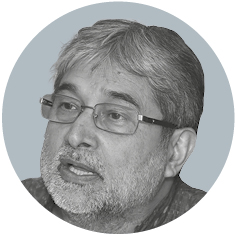Sociology
Reconciling diversity and the common good

Functional differentiation is what distinguishes modern societies from pre-modern ones. The term means that social systems such as the economy, science or law operate according to their own logic. That makes them especially dynamic, which in turn facilitates broad-based prosperity and scope for many individual decisions on how to live. Are development and functional differentiation essentially the same?
No, I don’t think so, but functional differentiation is certainly an important precondition for development. The core determinant is the powerful division of labour, not just between different sectors but between functional systems. The science system is geared to discovering truths, the economy to maximising profits and the legal system to law abidance. Functional differentiation results in a pluralisation of society and ultimately requires democratic discourse because top-down governance in an authoritarian style becomes impossible. In regard to careers and personal identities, merit, personal achievements and qualifications matter more than family, faith and ethnic affiliation. Many societies with advanced functional differentiation have strong, successful economies. Examples include the Scandinavian countries, Germany and Singapore. These countries mostly, though not always, are democratically organised. The point is that democratic discourse can resolve the tensions that arise between functional systems, even if that of course cannot be taken for granted. It thus makes sense for international development agencies to pay attention to good governance, inclusive institutions, transparent decision-making and the recruitment of leaders according to merit, rather than family ties for instance. These things are essential for a nation to harness its full potential.
Functional differentiation does not require democracy right from the start. One can use the term to explain China’s spectacular success under Deng Xiaoping. His authoritarian development regime actually started separate branches of the state from one another, for example by testing certain rules in certain areas and creating an environment in which free enterprise became possible. To a considerable extent, property law and labour law were codified and no longer subjected to the regime’s arbitrary whims. A capital market was established. The public education and health systems were strengthened, and in these fields government institutions do not restrict markets. They facilitate them. There is a human-rights dimension too. Beijing insisted for many years that social and economic human rights took precedence over civil liberties. And indeed, formal democracy may actually slow down functional differentiation in places where a huge share of the people remain excluded from public life due to poverty and a lack of education. That is also the case where powerful interest groups block change. I wonder, however, whether China still has a development regime today. I do not think Xi Jinping is bringing about more functional differentiation and more scope for independent action.
There are other examples of successful authoritarian development regimes. Consider Singapore, where I have done substantial research over the years and lived for some time. This city state is much smaller than China, of course. It calls itself a one-party democracy, and it has laid the foundations for impressive economic growth. Yet, market enthusiasts tend to overlook the fact that Singapore does not simply allow market forces free reign. The government redistributes wealth with determination. It has built strong, well-functioning and performing education and health-care systems. It ensures that there is enough affordable housing, attracts ‘foreign talents’ and strategically builds up economic sectors of future global relevance, such as biotechnology or creative industries. The rule of law is in force. Professional careers and personal status depend on merit, formal education and personal achievement. Markets must be in embedded in such a functionally differentiated order to prosper, but they cannot create that order themselves.
Authoritarian rule, however, does not automatically lead to effective functional differentiation. Pakistan, Egypt and Nigeria are countries that stagnated for decades under military governments. All too often, dictators merely exploit countries. Apparently, a development regime needs to have an idea of the common good.
Well, the Singaporean state and the Singaporean society formed a tacit agreement after independence in 1965. The government’s implicit promise was to ensure everyone’s welfare for the price of renouncing selected civic liberties. The Asian values discourse in the 1990s fit that pattern too, stressing supposedly Asian values such as industriousness, frugality and family cohesion. Things are changing however. The recent election saw the opposition gain 10 of the 93 seats in Singapore’s parliament. That used to be unimaginable. Whilst social inclusion and the integration of society are still being emphasised, society is beginning to support demands for democracy. It is noteworthy that development regimes – in contrast to right wing populists – normally stress common values that bridge ethnic or religious divides. A development regime does not thrive on social fragmentation.
In theory, we expect progressing functional differentiation to lead to pluralistic exchange and eventually to democratisation. That has happened in South Korea and Taiwan, and the trend is perceptible in Singapore, but not in China so far.
Western scholars tend to under-appreciate that more functional differentiation may cause disintegration. That is particularly true where social diversity is big to begin with – as in China or Singapore. Singapore is a multi-cultural and multi-ethnic city, so no one can take cohesion for granted. On the other hand, paternalism disempowers people and can obscure existing tensions. It was quite telling that Singapore largely managed to contain the Covid-19 pandemic, but then the virus started to spread fast in migrant workers’ shelters. The government’s idea of the common good had only taken account of its citizens. We can observe something similar in the EU. This alliance of democracies has a pattern of generally endorsing human rights, while regularly disregarding the human rights of refugees at the same time.
An authoritarian development regime typically emphasises nationhood, promising to make the country catch up with world leaders. Stressing one’s own nation’s interests, however, causes tensions in the global arena. In the jargon of systems theory, globalisation does not simply mean free trade. It stands for the functional differentiation of global society, and functional systems have indeed been transcending national borders for a long time. It is no coincidence that we need global solutions for global challenges such as climate change, financial instability, pandemics et cetera. The implication is that we need an understanding of something like a global common good. Do the UN’s Sustainable Development Goals (SDGs) serve this purpose? And do they suffice?
The SDGs are ambitious, and they certainly point in the right direction. However, broad-based support is challenged by the current crisis. Further, the language is rather bureaucratic, and multilateral decision-making is often cumbersome. An underlying reason is the divergence of values which makes it difficult to reach global consensus. At the same time, the Covid-19 pandemic shows just how crucial the SDGs are in terms of a shared vision of our common future. It also matters that the SDGs offer a coherent approach. Indeed, human, animal and planetary health are mutually interdependent. Protecting them is a global common good. Unfortunately, the pandemic also means that fiscal space is shrinking, so it is becoming more difficult to achieve the SDGs.
Aren’t conflicts of interests even more destructive in multilateral affairs? You can’t distil any set of values from the USA’s current foreign policy. Its only evident aim is to boost the power of President Donald Trump. His party is in favour of free trade, unless its president introduces tariffs. It opposes deficit spending, unless that deficit results from its own tax cuts. It preaches family values, but stays silent when its president pays hush money to a porn star. Trump’s style of governance is geared to undoing functional differentiation. Expert knowledge is made fun of, his family’s interests are prioritised and any dissenter is declared to be an enemy of the people. Trump wants control of everything, but his policies are incoherent. They are only designed to boost his power and provide him with acclaim.
That is a valid assessment of the current situation, but it is equally true that we have been grappling internationally with the serious divergence of values for a long time. The USA stresses individual freedom, whereas the state must have a leading role in Chinese eyes. Successful global governance geared to promoting the global common good requires more consensus and more compromise. We need more exchange and more debate. We need to get to know one another better. The SDGs give us a glimpse of what the global common good should look like, but much must yet happen for them to become global guidelines for policymaking. Around the world, we must invest more in all forms of education, in line with the philosophy of enlightenment. Unless people are empowered to critically assess their own situation, they will not be able to make independent decisions. People need a solid education to cope with rapid change in their natural and socioeconomic environments. Moreover, education is a precondition for understanding what matters to others. Mutual empathy will help us to find shared solutions.
I agree, but we will be accused of being Euro-centric if we refer to European enlightenment. It is unfortunately true that Voltaire, the important proponent of enlightenment philosophy, benefited from the slave trade.
Yes, and Thomas Jefferson and other founding fathers of the USA were slave owners. Nonetheless, Jefferson wrote the beautiful words of all men being created equal and enjoying inalienable rights. This is a proposition that we should not fall behind of, while of course, we would add “women”, today. That he himself did not live up to his principles does not invalidate them. A good education system can spell out the crimes of the colonial age and endorse the validity of enlightenment at the same time. The Universal Declaration of Human Rights is based on the same philosophy. If we forgo it, we will not see development geared to the common good – neither at global nor national scale.
Anna-Katharina Hornidge is a development and knowledge sociologist. In March 2020, she became professor of global sustainable development at the University of Bonn and director of the German Development Institute / Deutsches Institut für Entwicklungspolitik (DIE).
Twitter: @AnnaK_Hornidge













